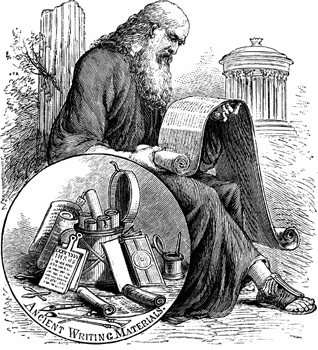 Poetry: Does It Still Matter?
Poetry: Does It Still Matter?
 Poetry: What Is It?
Poetry: What Is It?
 What Does Poetry Do?
What Does Poetry Do?
 Reading Poetry
Reading Poetry
 Obscurity in Poetry
Obscurity in Poetry
 Beginner's Guides to Poetry
Structure
Beginner's Guides to Poetry
Structure
 Poets on Poetry
Poets on Poetry
"One function of the poet at any time is to discover by
his own thought and feeling what seems . . . to be poetry at
that time." [Wallace Stevens, The Necessary
Angel: Essays on Reality and the Imagination vii (New York:
Random House, 1951)]
 Poetry: A Literary and Theoretical Perspective Poetry: A Literary and Theoretical Perspective
 Essays: Poetry Criticism
Essays: Poetry Criticism
 Classical Essays & Writings
Classical Essays & Writings
 Current State of Poetry
Current State of Poetry
 Poetry online
Poetry online
 Anthologies
Anthologies
William Cullen Bryant, A Library of Poetry and Song; Being Choice Selections from the Best Poets (New York: J.B. Ford and Co., 1872) [online text]
Rufus W Griswold, The Poets and Poetry of America
(Philadelphia: Carey and Hart, 1842) [online text]
Samuel Kettell, Specimens of American Poetry with Critical and Biographical Notices (3 vols.)(Boston: S.G. Goodrich, 1829) [vol. 1: online text] [vol. 2: online text] [vol. 3: online text]
Harriet Monroe & Alice Corbin Henderson, The New Poetry: An Anthology (New York: Macmillan Co., 1917) [online text]
Edmund Clarence Stedman, An American
Anthology, 1787-1900: Selections Illustrating the Editor's Critical Review of American Poetry in the Nineteenth Century (Boston: Houghton, Mifflin and Co., 1900) [online text]
Louis Untermeyer, Modern American Poetry: A Critical Anthology (New York: Harcourt, Brace and Co., 1921) [online text]
Richard Grant White, Poetry, Lyrical, Narrative, and Satirical of the Civil War (New York: American News Co., 1866) [online text]
 Books About Poetry Books About Poetry
Max Eastman, Enjoyment of Poetry (New York: Charles Scribner's Sons, 1921) [online text]
Francis B Gummere, The Beginnings of Poetry (New York: MacMillian Co., 1908) [online text]
Jay B Hubbell & John Owen Beaty, An Introduction to Poetry (New York: Macmillan Co., 1922) [online text]
James L. Oderdonk, History of American Verse (1610-1897) 57 (Chicago: A.C. McClurg, 1901) [online text]
Marguerite Ogden Bigelow Wilkinson, New Voices: An Introduction to Contemporary Poetry (New York: Macmillan Co., 1928) [online text]
 Books About Poets Books About Poets
Louis Untermeyer, The New Era in American Poetry (New York: Henry Holt, 1919) [online text] [includes chapters on Edgar Lee Masters and Charles Erskine Scott Wood]

An excerpt from Putnam’s Magazine. Original Papers on Literature, Science, Art and National, vol. 1 (6), p. 718 (June, 1868):
What is poetry good for? what does it prove? — are questions very like to be propounded by some of our busiest men, whatever may be their profession, whenever they are invited to judge for themselves by reading, at least, a brief review of what is called a poem,— being of those who, when they are pestered with invitations to run away from their business for awhile, when the woods are flowering and the cheerful waters are singing for joy, excuse themselves by saying they can’t see the use of it; or they don’t believe it will pay. When business is good, they cannot spare the time; and when it is bad, they can’t spare the money; and so they go on year after year, like a squirrel in his cage, travelling the same dreary round, without ever trying to escape, though the door be sometimes left open, until they get to be men of one idea—in other words, no better than monomaniacs; for what were our many faculties given us, if only a few are to be exercised? Were they not all intended for use? And shall a man, made after God’s own image, be satisfied with growing old over his desk, and counting his gains every night before he goes to sleep instead of saying his prayers—even the little prayer of John Quincy Adams, “Now I lay me,” etc.? Shall he, having ears, hear not, by stopping them to music, when the bewildering harmonies of well-managed concert, or the rhythm of a stately, noble poem, are filling the air about him?—eyes, and see not, when the glories of architecture and sculpture and painting are all about his way? What were such men made for? only to neglect or abuse their gifts? to concentrate all their powers upon the gathering of riches? or upon the gathering of riches? or upon president-making? or, indeed, upon any one pursuit or occupation, forgetful of every other?


"Reading a Volumen, or Roll."
John D. Quackenbos, Illustrated History of Ancient Literature, Oriental and Classical. (New York: Harper and Brothers, 1882)(used with permission of the Florida Center for Instructional Technology)

Strangers to Us All: Navigational Links
 Alphabetical Index Alphabetical Index  State Index State Index
 Chronological Index Chronological Index
 Contemporary Lawyer Poets: A-L Contemporary Lawyer Poets: A-L
 Contemporary Lawyer Poets: M-Z Contemporary Lawyer Poets: M-Z
 Strangers
to Us All—Homepage Strangers
to Us All—Homepage
|